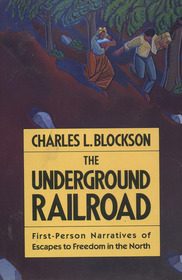Contains fascinating stories from escaped slaves, as well as black and white members of the Underground Railroad. The routes and procedures of the Underground Railroad are also discussed. The stories are arranged by state for slave states and by regions for free states. Some stories date back to the 18th century.
Particularly interesting were the stories of crowds in the northern states assembling in large numbers, often in the thousands, to force the release of slaves captured by slave hunters in northern states operating under the "protection" of the Fugitive Slave Act. These were spontaneous acts of resistance against a Federal law. In some cases, free state judges declared the Fugitive Slave Act to be unconstitutional.
One story by a person taking credit for relating to Harriet Beecher Stowe one slave's escape which Stowe then used as the escape of "Eliza and her child" in her book "Uncle Tom's Cabin," didn't ring true. This was because I read another book about a young black woman and her child escaping across the Ohio River in the winter. This story was later repeated to Stowe when she was visiting Abolitionists in the Mid-West before she wrote her book. That story was more convincing. Stowe than took literary license when she included that incident in her book.
Particularly interesting were the stories of crowds in the northern states assembling in large numbers, often in the thousands, to force the release of slaves captured by slave hunters in northern states operating under the "protection" of the Fugitive Slave Act. These were spontaneous acts of resistance against a Federal law. In some cases, free state judges declared the Fugitive Slave Act to be unconstitutional.
One story by a person taking credit for relating to Harriet Beecher Stowe one slave's escape which Stowe then used as the escape of "Eliza and her child" in her book "Uncle Tom's Cabin," didn't ring true. This was because I read another book about a young black woman and her child escaping across the Ohio River in the winter. This story was later repeated to Stowe when she was visiting Abolitionists in the Mid-West before she wrote her book. That story was more convincing. Stowe than took literary license when she included that incident in her book.




